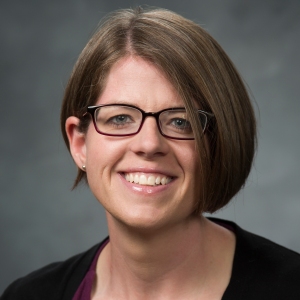Interview With Dr. Katy Cabbage of Brigham Young University

Katy Cabbage, PhD CCC-SLP is a former school-based speech-language pathologist who is now an Assistant Professor at Brigham Young University in Provo, Utah. Dr. Cabbage’s research interests center on links between early speech and language skills and later literacy acquisition. She is specifically interested in identifying predictors related to difficulty acquiring literacy acquisition in children with speech sound disorders and/or language impairment.
Note: You should consult with your doctor or speech pathologist for recommendations on treatment. The views and opinions expressed in this article are those of Dr. Cabbage and do not necessarily reflect the official policy or position of SpeechPathologyMastersPrograms.com
How did you become interested in phonological processing?
My current research interests stem from my clinical experiences when I was working in the schools as a school-based speech-language pathologist. As I worked with a wide variety of children with speech and language needs, I found that so many of these children also struggled to acquire literacy skills. I began asking a lot of questions about how children’s underlying phonological skills for speaking related to their ability to apply phonology to reading. And thus began my foray into research! I have a deep interest in better understanding phonological processing skills in children with speech/language impairment and how that relates to reading, but also better understanding phonological processing skills in struggling readers (whether or not they have a co-occurring speech/language impairment).
How can we better anticipate whether a child may have difficulty with literacy acquisition?
This is the primary aim of my current research program. At present, it often takes many years of failing to respond to reading instruction in the schools before a child is identified with dyslexia or another reading disorder. By this time, the child may have developed negative attitudes about school, reading, or even himself. Speech-language pathologists are on the frontlines of finding these kids because we work with these children long before they enter school! Preschool-aged children with speech and language impairment are at significant risk for dyslexia and other reading disorders. By learning how to recognize the children who are most at risk, we may be able to catch these kids earlier and start the most efficacious interventions to prevent the development of negative attitudes and side effects of struggling to read.
What are some of the most important thing we have learned about this area of speech pathology in the last couple of decades?
The good news is that, although there is much yet to learn, we have a much better understanding of how to identify children who are struggling to acquire reading skills. Deficits in phonological processing are a key part of this identification process, but certainly not the only contributor to strong literacy abilities. At this point, we know to watch children for deficits in phonological awareness, which involves children’s’ understanding of how sounds combine together to form language. In early childhood, we watch for children who struggle with things like rhyming, identifying words that start or end with the same sound, or being able to break words apart into syllables and sounds. Beyond phonological processing, it is also crucial that we’re attending to children’s oral language skills. We know that children who struggle to comprehend oral language and/or retell stories about books or their own lives are at greater risk for literacy deficits once they begin learning to read in school.
What kind of impact does early detection have on these children?
Early detection is key for children with language and literacy deficits. We have a relatively short period of time between when a child’s difficulties become more obvious (because they are having a hard time learning to read) and when they begin to develop negative attitudes about schooling, their own intelligence, and/or their pleasure in reading. Early detection allows us to identify who these children are more quickly while also bolstering their understanding that just because they might have a hard time reading, that has no bearing on their intelligence or their ability to be a great student.
What are some of the barriers to making sure children that have difficulty with literacy acquisition get the help they need?
One of the key problems is identifying which children are struggling because of a true deficit in language or literacy acquisition, and which children may appear to be struggling because of other factors such as reduced exposure to language and literacy stimulation or because they are learning a different language than their home language. The good news is, SLPs are uniquely qualified to help on both of these fronts! If early identification is key (and it is!), SLPs are on the frontline for helping identify children who are most at risk for future language and literacy deficits. Often, children with underlying phonological deficits first manifest with a speech sound disorder or other difficulty with speech production during the early preschool years. Many of these children also have co-occurring language difficulties and may have difficulty learning and using new vocabulary, difficulty following complex instructions, and/or have a tough time telling narratives about their experiences. As speech pathologists, I think we are getting better at helping identify these children. As a field, one particular challenge we have is helping other professionals who work with young children spot these early warning signs as well, such as early childhood educators, pediatricians, daycare providers, etc.
How do you select new research projects?
I have so many questions that I want to help answer that sometimes it can be hard to narrow down which projects are the most appropriate and how to best maximize my expertise and my time in research. The rule of thumb I use is to go back to the basis for why I do what I do: I care deeply about ensuring that all children, regardless of speech and language skills, acquire the skills they need to succeed in literacy. So, before I begin selecting any new research project, I ask myself, “Will this study help us better understand how speech and language connect to literacy skills?” So far, I have found that as long as I keep my long-term question in mind, it becomes pretty clear which projects will lead to and which may veer away from that central question.
What aspect of your research are you most proud of?
I am most proud of bringing more awareness and focus to the overall impact having a speech sound disorder may have on a child. Often, in our field, children with speech sound disorders are treated as having a more minor communication disorder. But, I have seen firsthand the difficult academic and social challenges children with speech sound disorders have because their communication disorder is highly visible and noticeable. I am incredibly proud of the opportunity I have to advocate for these children (and adults!) as I help our field better understand the underlying nature of speech sound disorders (i.e., what causes these disorders? How do different speech sound disorders manifest? What are the best treatment options for these children?) and their impact on other areas of children’s lives, including literacy acquisition.
What is your advice to those considering getting a master’s in speech-language pathology?
If you are pursuing a master’s in speech-language pathology, that tells me already that you care deeply about people and you have a desire to help all people have the skills they need to connect through communication. My number one piece of advice is to connect often with that deep desire you have to help those who struggle improve their communication skills. This work can be challenging and overwhelming (particularly as you set off to start your master’s program), but it is FUN. There is so much joy to be had in helping children with limited communication skills connect with their parents; helping adult patients who have lost an ability to communicate reestablish communication patterns and behaviors; etc. Remember why you wanted to join this amazing field in the first place – and if you can connect with that, your master’s program will be great.
Sponsored online speech pathology programs

Online MS: Pursue SLP Certification. Study FT/PT
Speech@Emerson enables you to earn an MS online and pursue SLP certification in as few as 20 mos. Learn the same curriculum as the on-campus program. Study FT or PT.
- Prepares you to pursue certification as an SLP generalist
- In-person clinical placements at faculty-approved partner sites
- As few as 20 months to complete
SPONSORED

Want to Become an SLP? Earn an MS Online at NYU
NYU Steinhardt’s online master of science program in Communicative Sciences and Disorders prepares aspiring speech-language pathologists with a comprehensive professional education.
- Prepares students to pursue SLP licensure
- Accredited by ASHA’s Council on Academic Accreditation
- As few as six terms to complete
- Full-time and part-time plans of study
SPONSORED

Online MS in Speech-Language Pathology from Pepperdine University
Pepperdine University’s online Master of Science in Speech-Language Pathology program combines a robust, innovative curriculum rooted in Christian values with a full-time or part-time option that features online learning, on-campus intensive experiences, and comprehensive clinical field practicums to prepare skilled, compassionate students for careers as speech-language pathologists.
- Full-time (five trimesters) or part-time (eight trimesters) options available.
- No GRE scores required.
- 400+ supervised, clinical learning hours are done at schools/clinics local to students
- Three onsite experiences build a sense of camaraderie and community throughout the program
SPONSORED

